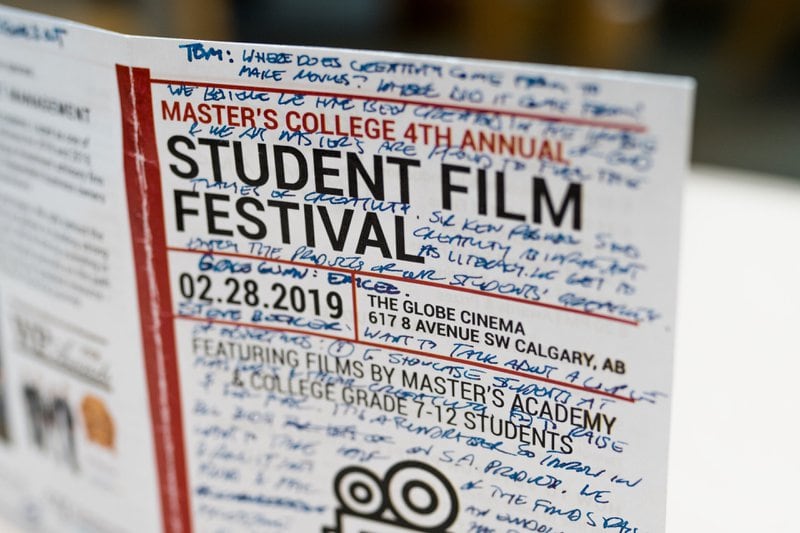
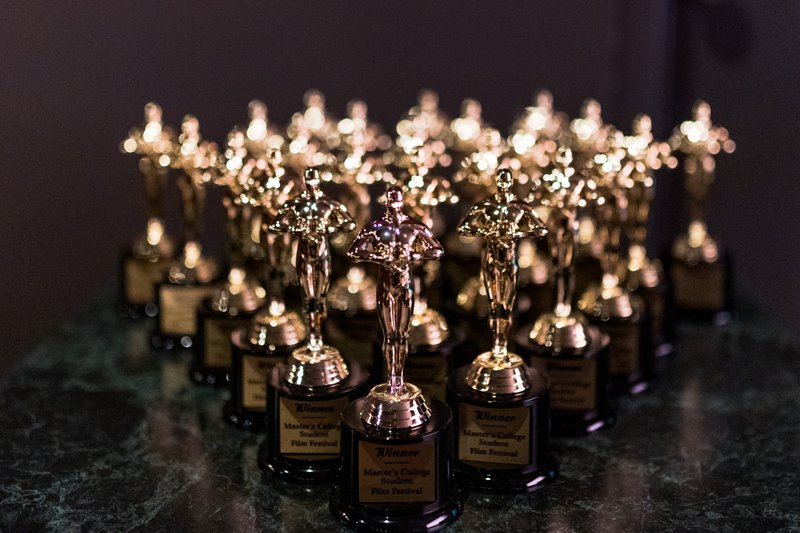
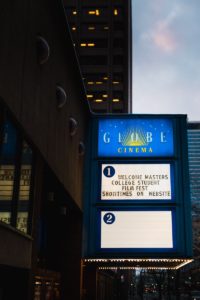 “I need a line—just one opening line,” I thought to myself as I pulled off Glenmore taking the ramp onto Crowchild Trail on my way to the Master’s College 4th Annual Film Festival at the gritty downtown Globe Cinema. I knew I needed to write a blog post for the Film Festival, and any writer knows it’s always good to have a line or two in the back pocket ahead of time. My son and daughter were hunkered down with me in the van. I was running several opening lines by them, and they were offering their suggestions as well. To make writing the blog post more challenging, it was likely there wouldn’t be the drama of last year when I tripped down the aisle and inadvertently bumped into Shawn Boos while he was lining up a photo. And if there were going to be any drama that would pale that of last year, I most certainly didn’t want it—God forbid . . .
“I need a line—just one opening line,” I thought to myself as I pulled off Glenmore taking the ramp onto Crowchild Trail on my way to the Master’s College 4th Annual Film Festival at the gritty downtown Globe Cinema. I knew I needed to write a blog post for the Film Festival, and any writer knows it’s always good to have a line or two in the back pocket ahead of time. My son and daughter were hunkered down with me in the van. I was running several opening lines by them, and they were offering their suggestions as well. To make writing the blog post more challenging, it was likely there wouldn’t be the drama of last year when I tripped down the aisle and inadvertently bumped into Shawn Boos while he was lining up a photo. And if there were going to be any drama that would pale that of last year, I most certainly didn’t want it—God forbid . . .
No—no drama, I thought to myself, not this time. This time I’d play it straight—but then what?
 Parking was difficult. I veered into one spot, avoiding the necessity of a parallel park, only to realize that parking there would be prohibited in only 20 minutes’ time. I rolled down some back alley on my way to an underground parking lot, but didn’t like the vibe, so I pulled out onto 5th creating my own break in traffic and rolled into a parking lot on the corner of 8th and 5th. The parking was cheap and close to the Globe, which, given the Arctic Vortex, I was pleased with. At the door of the Cinema I greeted Steve and Jennifer Booker, the sponsors of the evening. I checked in, purchased a few raffle tickets and went up to the top floor that was awash in a plethora of amazing give aways. I cast my raffle tickets, redeemed my snack tickets (handing my kids tubs of popcorn and pop–making sure to orientate them to the washroom facilities), mingled a bit with familiar faces, and settled into a seat.
Parking was difficult. I veered into one spot, avoiding the necessity of a parallel park, only to realize that parking there would be prohibited in only 20 minutes’ time. I rolled down some back alley on my way to an underground parking lot, but didn’t like the vibe, so I pulled out onto 5th creating my own break in traffic and rolled into a parking lot on the corner of 8th and 5th. The parking was cheap and close to the Globe, which, given the Arctic Vortex, I was pleased with. At the door of the Cinema I greeted Steve and Jennifer Booker, the sponsors of the evening. I checked in, purchased a few raffle tickets and went up to the top floor that was awash in a plethora of amazing give aways. I cast my raffle tickets, redeemed my snack tickets (handing my kids tubs of popcorn and pop–making sure to orientate them to the washroom facilities), mingled a bit with familiar faces, and settled into a seat.
There was a definite buzz in the room as Grace Gunn, the Emcee of the evening, approached the podium and welcomed everyone to the Master’s College 4th Annual Student Film Festival.
 Then Tom Rudmik (Master’s Founder, CEO, and Imaginal Leader) greeted the audience by posing the question: Where does creativity come from to make movies? “We believe,” Rudmik continued, “that we have been created in the image of God, and thus it is God who gives us the ability to imagine and create; and we at Master’s are proud to fuel the flames of creativity, to foster the image of God in each of our students, and develop Imaginal Leaders: those who can see, learn from, and create the future. You know, Sir Ken Robinson said creativity is as important as literacy. Tonight we get to enjoy the products of our students’ creativity.”
Then Tom Rudmik (Master’s Founder, CEO, and Imaginal Leader) greeted the audience by posing the question: Where does creativity come from to make movies? “We believe,” Rudmik continued, “that we have been created in the image of God, and thus it is God who gives us the ability to imagine and create; and we at Master’s are proud to fuel the flames of creativity, to foster the image of God in each of our students, and develop Imaginal Leaders: those who can see, learn from, and create the future. You know, Sir Ken Robinson said creativity is as important as literacy. Tonight we get to enjoy the products of our students’ creativity.”
Steve Booker of Milestone Asset Management presented a few words about the objectives of the Film Festival: 1. To showcase students at Master’s and their creativity, and 2. to raise money for Master’s drama, robotics, and music programs. “It’s a fundraiser,” Steve urged, “so throw in big bids on our silent auction products.” Steve introduced and thanked his crew from Milestone, his wife Jennifer, and key members of IPOD and Master’s, namely Christy Howard, Wanda Metz, Fabrice Prepetit, and Rachel Primeau. Incidentally, Milestone Asset Management is listed as one of Canada’s Top 50 Financial Advisors for the past two years running: 2018 and 2019.
The theatre went dark, and the silver screen lit up as the first film began and the audience noise descended into a kind of anticipative silence.
Some of the films were terrifying, others gut-wrenchingly funny, and others just plain disgusting. Here’s a breakdown of the films from this writer’s perspective.
Brunch
A 21st Century take on the John Hughes classic The Breakfast Club. A group of teens are locked up in Saturday detention. They represent different social groups in the school (jock, dweeb, princess, brainer) which creates the conflict. The students escape detention and run through the school avoiding the bull-horns of the supervising teacher, and in the course of the tension become friends. Brunch concludes with one of the students calling home for a ride while music from the original Breakfast Club plays in the background (I thought the track was from the band Simple Minds, but not sure. If you know the name of the track and the band, please submit it to the comment section below this post). To me, this movie was witty, entertaining, and had a glossy layer of nostalgia that connected me to the ennui of my adolescence.
Bread
Russia has taken over America. The leader must be stopped. A group of former KGB detractors band together to stop him. They capture the leader’s main side-kick who, after several persistent slaps to the face, divulges the leader’s location. The cabal of Russian detractors go to the Russian leader’s house and assassinate him. This film was hilarious, and the scenario the students created had a good combination of complexity and irony. The names of the characters were also brilliantly evocative of Russian spy movies—someone did their homework in this regard. I laughed all the way through it.
Growing Up is Tough
A film about an adolescent who gets a ride to school with a group of friends. The ride turns into an ambush. The friends beat the protagonist up, take his jacket and backpack, and drive off in their black VW Jetta. While the protagonist is chasing them, he meets another boy on the sidewalk. The two become friends. The boy trains the protagonist in matters of intellectual and athletic performance. The victim thus emerges as the hero. The film indeed had a bit of a twist; but a part of me wanted to see the protagonist, when approached by the ambushers, throw-down Bruce Lee style revealing himself as a Kung-Fu expert or something. But perhaps that would be too obvious…
Dream
Dream was a subtle and complex film about a girl who ventures from home to school and back home again in a kind of wistful dreaminess. What is unveiled at the end of the film is that the home is a figment of her imagination. The girl is in fact homeless, and is dreaming of having a home that is secure and comforting. The film ends with a message about homelessness. The concept of this film, its phantasmagoric account of this musing young girl, was indeed clever, and the message was sobering.
Mask
How gruesome was that mask! I swear, I went to bed with near nightmares! And 75+ murder victims? It was a dark comedy whose irony barely eclipsed its terror. I didn’t know if I should laugh nervously or shudder—frankly I did both. The mask was a brilliant choice in my opinion—hideous and thus efficacious. Two things that were weird and humorous: the girl pouring milk first, then cereal (I heard one parent sitting behind me call out, “Who pours milk in their bowl first??”), and the other mixing orange and apple juice (been there, done that, don’t find it weird). There seemed to be quirks in each of the victims. Perhaps the murdering was a symbol for the restlessness of youth and the struggle for identity and uniqueness within the unrelenting pressure of collectivism. (If anyone wants to weigh in on this milk first/cereal last thing, please add it to the comments below. You might also want to weigh in on whether pineapple belongs on pizza.)
Gaga Ball
I thought this would be about some kind of bizarre soire thrown by a famous pop singer known for wearing dresses made of raw meat, but I was relievedly wrong. Gaga Ball is a film about a gaga ball player who meets his match—not by an actual opponent, but rather by his own clumsiness. The protagonist is an anti-hero who gets hit by a ball and breaks his nose, falls out of the pit backwards and breaks his pelvis, breaks his arm, and on it goes. The scenes of harm are presided over by a doctor who appears in a dreamlike metaphysical effervescence. He gives his medical advice only to return to earth to apply medical assistance that does more harm than good (the part where the doctor is winding toilet paper around the protagonist’s pelvis is a riot). There is a young reporter who gives a play-by-play commentary and interviews the protagonist after each major injury. Gaga Ball was an ironic riot of a film that culminated in the doctor hacking off the protagonist’s broken arm. Reminded me of that classic scene in Monty Python’s Search for the Holy Grail: “Just a flesh wound!”
Open Country
A documentary film capturing the divine beauty of nature, and the need for each of us to be open to the present moment. The entire movie is about beauty; the kind of beauty that, as we say of God, is everywhere filling all things. A kind of beauty that can only be perceived and entered into by attention to the present moment. In this film, Maryn overlays her reflections on life and beauty over stunning film work of horses, green leaves, and cityscapes. Her perception of beauty is not limited to the natural world, but includes the tacit rhythm of urban life—the car gliding along the road, the sun that sets across the glass facade of a skyscraper, the symmetry of brake lights. The final scene is a passage from Psalms about the beauty of the Lord. It made me almost weep—so deep and moving. A powerful message for all of us to pay attention to the beauty around us; and in that moment of attention, in that present moment in which we apprehend beauty itself, we see God.
Revenge
A thriller about a duo of malicious young ladies who attack and capture people. But they meet their match! A young boy is kidnapped and detained, and the sister seeks revenge. In an attempt to free her brother and escape, a fight breaks out—Boom! The boy cracks one of the assailants with an iPhone turning the tide. The oppressed now become the oppressors.
School’s Out
A group of young girls enter the school on a Saturday and dance around to an iPhone hooked up to gym speakers. But they are not alone. There is something haunting in the air, something off kilter, something perhaps sinister. One of the girls leaves the gym as a result of an injury sustained during the dancing, leaving the other two girls afraid for her life. The girls leave the gym and find their friend resting by some lockers. But they hear noises! In typical thriller fashion, the girls are locked in a paradox of trying to find the source of the noise while simultaneously running away from it. They hear something approaching! By now they’re upstairs in a hallway sitting with backs against a set of lockers. A futile hiding spot—right in front of the elevator! The elevator opens—the girls scream! It’s . . . it’s . . . the janitor (played in debonaire fashion by none other than Mr. Prepetit). This was a good film overall. The ending was certainly a surprise (I was hoping the stalker wasn’t wearing that horrid mask of Mask), and brought the movie to a humorous end.
Tracker Man: Episode 1, Catching the Sandork
There’s only one thing to say about this film: did we really need to see a toilet full of urine? The makers of this film were not mincing words when the genre was noted as ‘Reality TV’. I could have used a little less reality, frankly. Nevertheless, the weakness (too much reality) was indeed its strength; for it was a bit more gritty than other films, which gave it an edgy uniqueness. The directing was obviously daring, which I respect. And while grotesque, the toilet scene invoked strong memory—isn’t that worth something?
How It All Started
A film like glass mirror in which a young man meets two other selves who give him conflicting advice on how to approach a girl for a date. The one self is the ‘good’ self who gives a series of platitudes and advice; the other self is the ‘bad’ self who contradicts the good self, and gives platitudes and advice more cynical and direct. The young man abandons both selves and becomes a third self who goes his own way only to strike out with the girl. Three cheers for autonomy? I found the special effects to be quite good–for a low-budget student film. The story line was a tad weak, and I think the student was wise not to break the self any further into 4, 5, etc. The effects, nevertheless, were very good.
Judgement Day
The films were over, and the judging began. Two awards were up for grabs: the People’s Choice Award, and the Critic’s Choice Award.
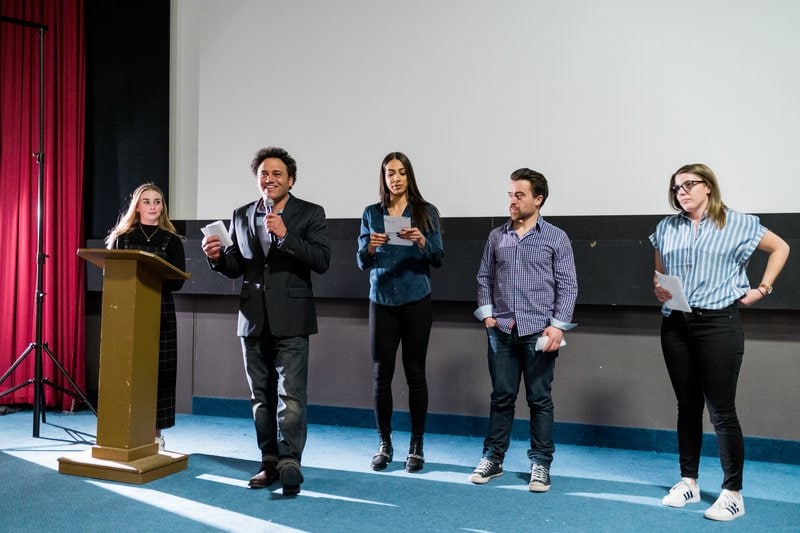
The People’s Choice Award was determined by the participants logging on to GoVote and ranking the films on a scale of 1 to 5. Simultaneously, the judges (Andrea Brayer, Steve Dierkins, Sarah Francis, and Kyle Pearsall) were deliberating on the Critic’s Choice. While deliberation was going on, the band C’est la Vie settled up at the front with guitars, stools, and music stands.
Yes, It’s C’est la Vie
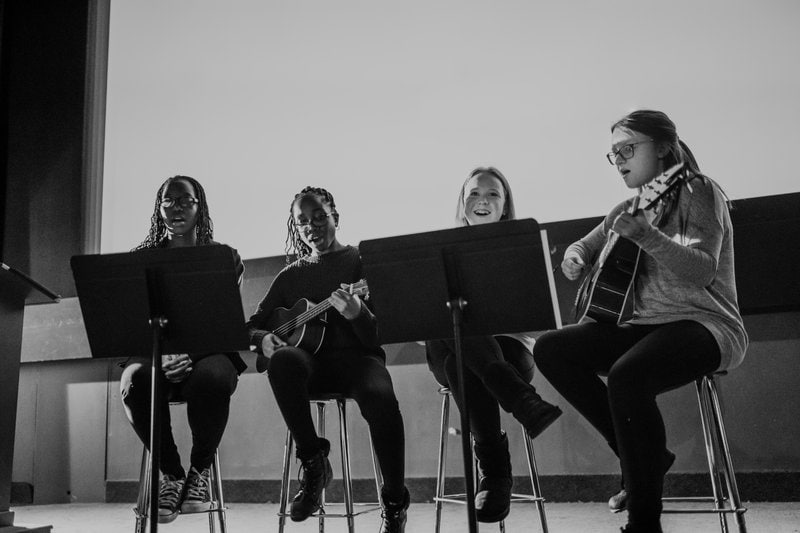
While judges and the audience deliberated on the films, the Master’s College girl-band C’est la Vie roused the Globe Cinema ‘unplugged’ with three outstanding numbers: the contemporary Christian ‘I Will Trust in You’, the controversial rock ballad ‘Titanium’, and the soulful spiritual classic ‘I’ll Fly Away’. In a solid performance, C’est la Vie delivered the soulful harmonies and guitar-rhythms that have made them one of the premier bands at Master’s. As C’est la Vie performed I’ll Fly Away, a group of students waved glowing iPhones in solidarity—indeed, good music brings hearts, and phones, together.
The People’s Choice Award
The People’s Choice results are below, with School’s Out taking 1st place, Bread coming in 2nd, and Gaga Ball a close 3rd.
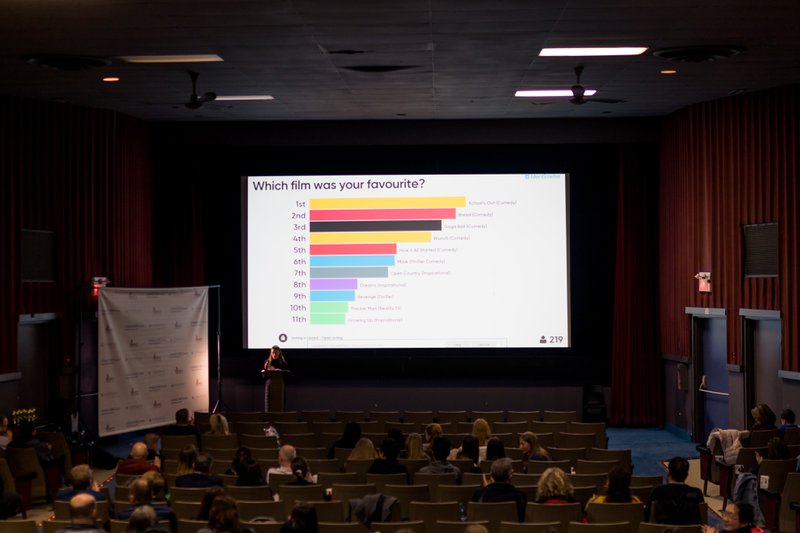
The Critic’s Choice Award
Next up was the Critic’s Choice Award. The judges we had for the night were the following:
- Andrea Brayer: A graduate from the New York Film Academy, and a Producer at Miracle Channel, producing shows such as Advancing the Kingdom, Devoted, The Leon Show, and The Spirit of Contemporary Life with Leon Fontaine.
- Steve Dierkins: A music producer and editor who worked on TV shows and movies such as The Magnificent Seven, Tarzan and Jane, The Lion King 3, and Anchorman: The Legend of Burgundy. Steve is also the owner of Studio D, a music production and recording studio in Calgary.
- Sarah Francis: A professional make-up artist at Rouge Make-Up Artistry in Calgary.
- Kyle Pearsall: A graduate from the Broadcasting Program at Mount Royal University. A short-film maker himself, he currently works as the Media Editor and producer for Springs Church Calgary.
The judges had a difficult task on their hands, for there were so many great films this year. The results of the Critic’s Choice were:
- In 1st Place: School’s Out
- In 2nd Place: Brunch
- In 3rd Place: Bread
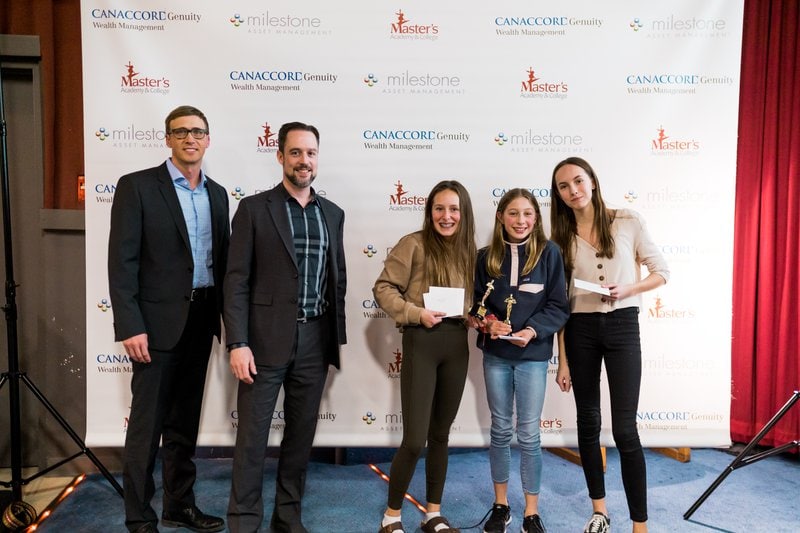
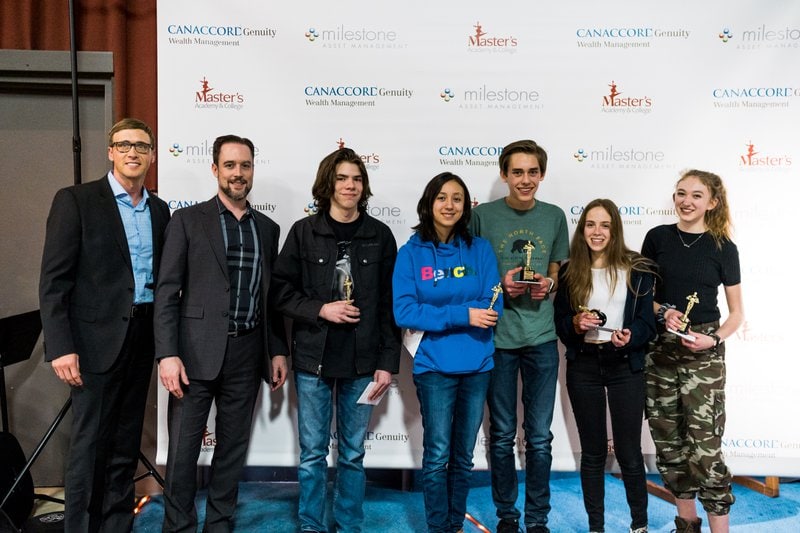
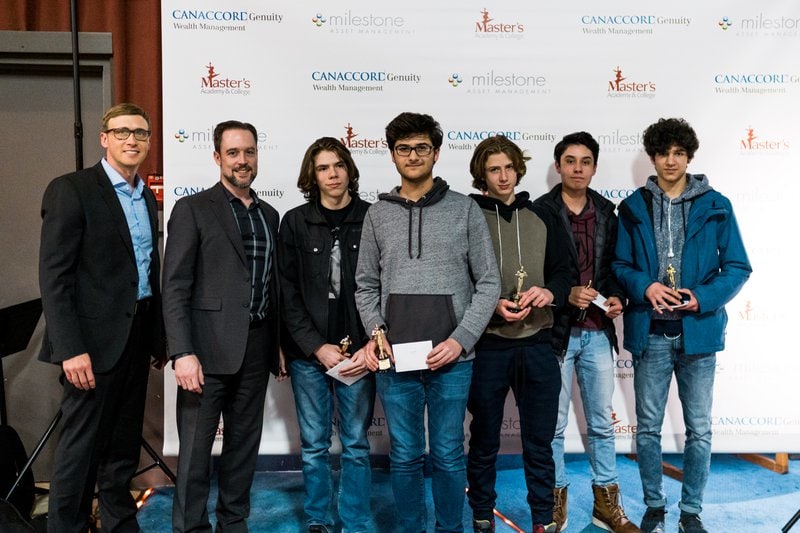
The Winner! (Yes—there’s only one)
It was School’s Out that absconded with both the Viewer’s and Critic’s Choice Awards—the first time in the 4-year history of the Film Festival that one movie took both prizes.
The winners were called up to the front for a photo-op—this is where I had the run-in with Shawn Boos last year. Incidentally, I spoke to him at intermission, and, in jocular fashion, we both agreed on how much more subdued the evening was given that our respective organizations had provided their own photographers.
The final part of the evening was the raffle winners. I sat there staring at the tickets in my hand in a state of self-deception: knowing that the numbers for the raffles I entered had already been called, but wondering if I had inadvertently placed them in totally different raffle items and thus still had a chance to win. There were a number of baskets to bid on, as well as a wine raffle for 20 bottles of wine—would make for a lively after-party, but from what I heard (and alas did not experience) Grace Kim, the winner of the raffle, was giving bottles away on her way out the door.
It was indeed a great event I thought to myself as the kids and I scuttled back to the van braving the windswept city night. Great venue, great films, great music, and great winners. And here I quote Steve Booker’s blog post (which I highly recommend you read), “This year’s Film Festival proved to be our best yet, not only in terms of money raised for the school, but also in terms of parent engagement and the overall vibe at the event.”
And as the van swung onto McLeod Trail South, and the streetlights cast an urban effervescent flicker across my windshield, I thought to myself, “A memorable event; indeed, a memorable event.”
And that one good line I thought I needed? Not necessary, I thought—no, no fancy opening lines, no drama, no shenanigans. Indeed, the night most certainly would speak for itself.
Great job Steve and Jennifer Booker, and all those at Milestone! And kudos to Master’s IPOD volunteers, faculty and staff—and we mustn’t forget those judges! And above all, thank you to all the students who worked hard to produce engaging films that made the evening a truly memorable one. We’ll do it up again next year!
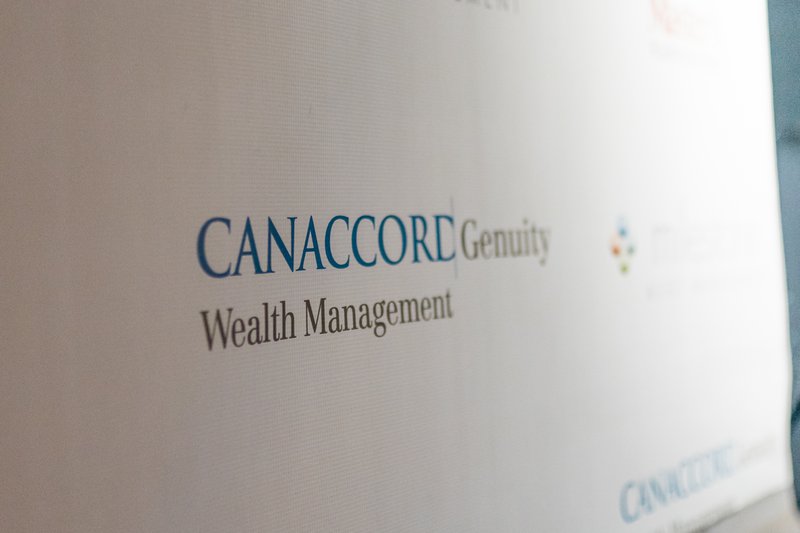

And all you students out there who saw the films and have incredible ideas for next year, start working on them—I can see the competition already growing!
If there’s anything you would like to say or add about the Film Festival, please feel free to post them to our comments section below. We’d love to hear from you!
